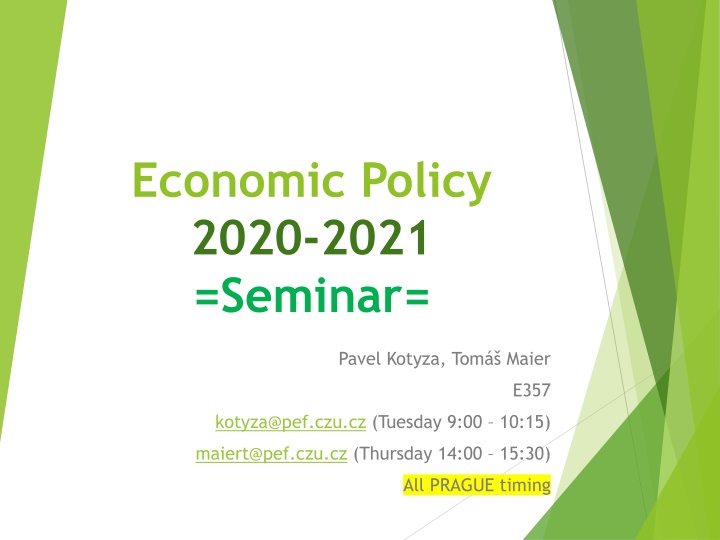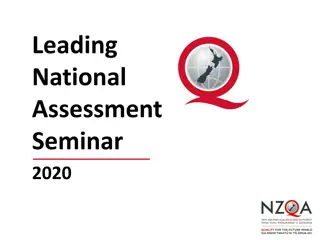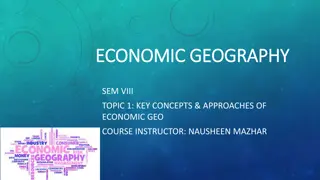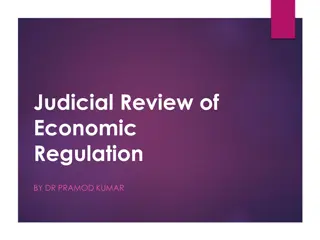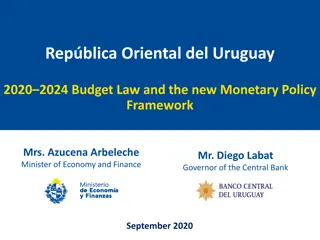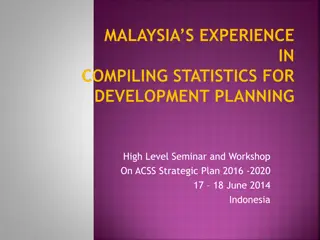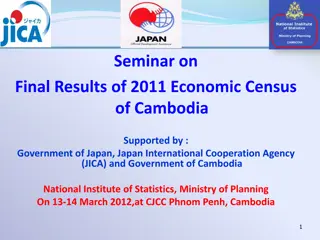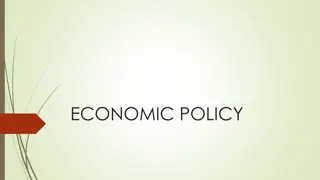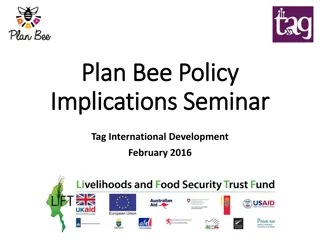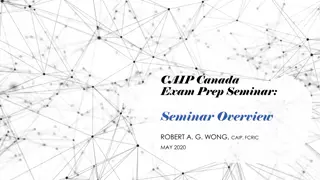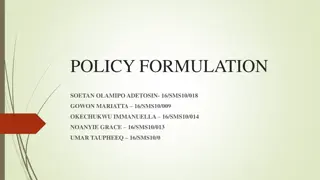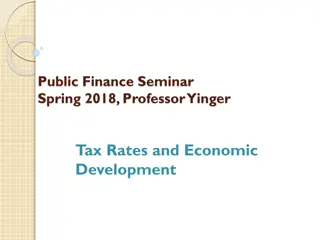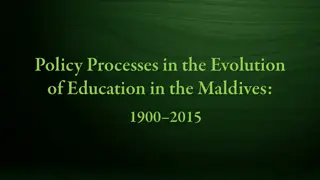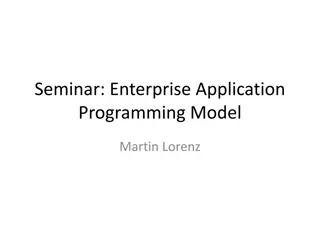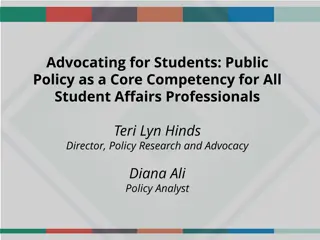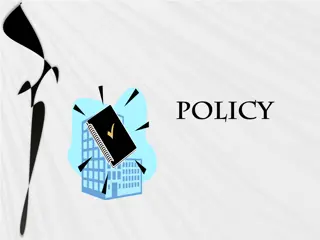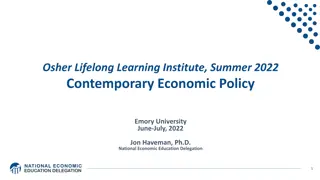Economic Policy 2020-2021 =Seminar=
The Economic Policy Seminar for 2020-2021 led by Pavel Kotyza and Tom Maier covers tools for economic policy analysis, Dutch disease, government intervention, poverty, crises solutions, and more. The structure includes lectures, seminars, tests, and presentations, with strict attendance rules and midterm requirements. Detailed information is available on Moodle, with teachers' contact details provided for inquiries.
Download Presentation

Please find below an Image/Link to download the presentation.
The content on the website is provided AS IS for your information and personal use only. It may not be sold, licensed, or shared on other websites without obtaining consent from the author.If you encounter any issues during the download, it is possible that the publisher has removed the file from their server.
You are allowed to download the files provided on this website for personal or commercial use, subject to the condition that they are used lawfully. All files are the property of their respective owners.
The content on the website is provided AS IS for your information and personal use only. It may not be sold, licensed, or shared on other websites without obtaining consent from the author.
E N D
Presentation Transcript
Economic Policy 2020-2021 =Seminar= Pavel Kotyza, Tom Maier E357 kotyza@pef.czu.cz (Tuesday 9:00 10:15) maiert@pef.czu.cz (Thursday 14:00 15:30) All PRAGUE timing
MOODLE PASS . PASSWORD: WE 845 EP21WE0845 WE 1030 EP21WE1030 TH 1030 EP21TH1030 FR 0845 EP21FR0845 FR 1030 EP21FR1030 You can record the seminars, but you cannot publish it.
Structure of seminar Some introductory notes Teachers of the Course Program of the course Structure of seminar Demands and rules Little theory
Teachers Internal: Doc. Ing. Irena Bene ov , Ph.D (Lectures) Ing. Pavel Kotyza, Ph.D. (Seminars, Lectures) Ing. Tom Maier, Ph.D. (Seminars) Office E 357 (FEM-CULS) Officce Houres: Thursday 14:00 15:30 (only in semester) Phone: 224 382 133 https://home.czu.cz/maiert/ Google Meet
Preliminary program Week Topic TEST Seminar 1: Tools for Economic Policy Analysis Week 1 Free week Week 2 Seminar 2: Dutch diesease and production factors Seminar 3: Economic policy and government intervention TEST 1 (L1, L2, S1)* Week 3 Week 4 No seminar, Study block Week 5 15.3.2021 Midterm essay Seminar 4: World institutions Week 6 No seminar, Study block Week 7 TEST 2 (L3, L4, S2, S3)* No seminar, Study block Week 8 No seminar, Study block Week 9 No seminar, Study block Week 10 Seminar 5: Poverty, inequality, well-being Week 11 Test 3 (L5, L6, S4, S5)* Seminar 6: Economic crises solution Week 12 *S = seminar; L = Lecture
Structure of seminar Discussion on up-to-date topics Little theory 2 x presentations, different groups, each for 20 minutes in PPT Questions & Answers & Comments, Discussion, additional work DETAILED INFORMATION ARE AVAILABLE ON MOODLE IN FILE: Seminar requirements 2020 - 2021 CovidUpdate
Demands and rules of the course Attendance. One (1) absence is allowed, more than one absence can be excused only with medical certificate. Group presentation of the case study (in groups) everybody takes part in presentations preparation, EVERYBODY contribute to PRESENTATION Those who will be indicated by other group members that did not participated, will not be evaluated for presentation Tests MID-TERD Essey Study block attendance (obligatory) and tasks done Student needs to receive at least 22 POINTS from seminar and Moodle activities to be allowed to sit for EXAM. = 55%
Attendance This means 1 absences in seminars without any necessity to explain the reason In case of longer illness or any other problems, please keep in mind that you have to prove it (e.g. by medical certificate) Foreign police / Embassy visit is no excuse, unless
Final evaluation Seminars Presentation (20p) Midterm essay (10p), 15.3.2021, 7:45, MOODLE 3x Moodle tests. Each point from the test will be multiplied by 0.25, i.e. from 40p you can get 10p that will be counted) Study block Required tasks (20p) Examination Multiple-choice (10) and opened questions (5) (40p, min. 24p to pass the exam) BONUS POINTS = MAX 5 (from lectures and seminars based on your other activity, TBD)
Evaluation Final mark will be based on the sum of all reached points. 90p 100p or more Excellent (1) 76p 89p Very good (2) 60p 75p Good (3)
TESTS You can expect 3 tests during the semester Tests will be related to lectures and seminars Multiple choice questions 13 (?) + 13 (?) + 14 (?) = 40 questions Tests will be organised in MOODLE Section Uploads & Quizzes & Exams TEST 1: February, 22 February, 26 (Mo - Fri) Lecture 1 (Introduction and conceptual approach.) + Lecture 2 (Production factors) + Issues from Seminar 1. TEST 2: March, 29 April, 2 (Mo - Fri) Lecture 3 (Trade + Development policy) + Lecture 4 (Food and Agri Policy) + questions from Seminar 2 (Dutch disease) and Seminar 3 (Market failures). TEST 3: April, 26 April, 29 (Mo Thu; 4 days only!!) Lecture 5 (European Integration) + Lecture 6 (Fiscal and Monetary policy) + Issues from Seminar 4 (World institutions) and Seminar 5 (Poverty, inequality, well-being).
PRESENTATION TEAM WORK 3 - 4 MEMBERS mixed international teams are preferred The presentation should take max 20 minutes, longer performance will be stopped Needs to fulfil all standard formal requirements (i.e. use of proper English symbols, resources, currencies, decimal points, etc.) All presentations are to be available on the Moodle in advance to all participants. Therefore file has to be uploaded to Moodle a day prior to the presentation. It must be uploaded by 5.00 p. m. ALL TEAM MEMBERS TAKES PART IN THE PRESENTATION. NO READ If problem and presentation STOPPED, repeat = 50% points
PRESENTATION Groups will need to submit seminar presentation that would deal with their seminar topic. Presentation shall be analytical, i.e. groups should not only prepare literature overview, but shall propose, based on literature and data analyses, significant and objective conclusions. Introduction Aims Methodology (stating your own research question) Topic overview. Own analyses and discussion/comparison. Your analyses should be prepared and presented in the given sequence: 1) Own analyses of available data and preparing your own conclusions (answer to research question) 2) Comparison / Discussion of your own conclusions with available literature (different authors). OWN conclusions. If not mentioned before, state news or up-to-date issues. References.
PRESENTATION Evaluation Your performance will be evaluated from the following viewpoints: Timing of presentation (1p) Topic relevance (1p) Style of presentation (2p) Presentation uploaded to Moodle on time (1p) Format and formal requirements (2p) Logical structure (1p) Defined aims (1p) Methodology quality (3p) Own results (4p) Discussion (2p) Ability to answer asked questions (2p) TOTAL = 20 points
PRESENTATION Presentation needs to fulfil following requirements: Everything shall be properly quoted (resources below each table, graph, diagram, etc.) Topic shall be presented in a neutral way (no subjective point of view is expected) e.g. shall present both positive and negative aspects. present up-to-date ideas on the issue (mainly from the research articles) and find weaknesses of presented ideas Use books, academic articles, official publications and databases as a main source of information. Do not use sources as Wikipedia, Investopedia, etc.
Sources of Information and DATA https://www.sic.czu.cz/cs/r-8833-odborne-databaze/r-8883- infozdroje Scopus ScienceDirect Ebsco Scholar.Google.com, books.google.com OECD National Statistical offices EUROSTAT / FAOSTAT Data from UN Agencies WORLDBANK Comtrade Etc.
Presentation TOPICS 2ndseminar (Week 3) DUTCH DISEASE AND PRODUCTION FACTORS Role of natural resources in national economy case study of Russia or Mongolia or Kazakhstan, etc. Role of natural resources in national economy case study of Norway. 3rdseminar (Week 4) ECONOMIC POLICY AND GOVERNMENT INTERVENTION Comparison of liberal and protectionist approach to specific economic policy (compare 2 countries). Comparison of liberal and protectionist approach to specific economic policy (compare 2 countries). Anyone has state exam this May/June?
Presentation TOPICS 4thseminar (Week 6) WORLD INSTITUTIONS Impact of International Monetary Fund s assistance to selected country. Impact of World Bank Group (specifically IDA) assistance to selected country. 5thseminar (Week 11) POVERTY, INEQUALITY, WELL-BEING Comparison of income inequality in developing and developed countries (countries to be selected and compared). Difference between UN Poverty measure and Multidimensional poverty index (different countries to be compared) 6thseminar (Week 12) ECONOMIC POLICY FOR CRISES SOLUTION Policies (Policy tools) implemented in COUNTRY to tackle economic crises and policy outcomes (country to be selected and agreed by teacher). Policies (Policy tools) implemented in COUNTRY to tackle economic crises and policy outcomes (country to be selected by teacher).
Project selection You will have chance to sign for the group project topic on Moodle FRIDAY, 12 Feb, at 2 p.m. (14:00) Prague time https://moodle.czu.cz/mod/choice/view.php?id=860434 But first you need to be registered for the right seminar, use the correct password After registration I need to receive EMAIL with group members. otherwise, group selection not accepted. Registration is opened up to Tue, Feb 18, 5 p.m.
Economic Policies Could be understood as: Approach of the state toward its own economy, it is always intentional and real activity Theoretical discipline that analyse ongoing phenomenon and propose specific measures using given instruments. There does not exists single truth. Used measures result from theoretical background of governments. - Who is responsible for economic policies used? -
Economic Policies could be understood as government seeking for conscious and qualified social consensus within economy of given country.. We search for answers: WHO are they? actors of economic policies What instruments? Why? targets, aims of the policy What are (expected) outcomes?
Actors of economic policies Private Persons Government Investors Consumers NGOs WHAT ARE THEIR INTERESTS?
Relationship between aims and tools Rule of system conformity Using tools that are in harmony with system of the country (e.g. in open market economy shall not be used price setting instruments) Stability of policies (W. Eucken) Not necessary 100% unchangeability, but rather its future predictability and transparency => confidence Principe of responsibility (J. E. Meade) One macroeconomic goal should be controlled by single institution that is also for the goal responsible (e.g. National Banks)
What does policymakers do: Set and enforce the rules of economic game Tax and spend Issue and manage the currency Produce goods and services Fix problems or pretend to Negotiate with other countries Etc. Benassy A. (2010) Economic Policy: Theory and Practice.
Tools Positive (supporting) Negative (prohibiting) Market (indirect) Exposure level = Micro and macro level Action = Fiscal, monetary etc. Influence = Direct and indirect The way how they interact = Selective and general And of course combinations
After a while you will be divided into small groups Listen carefully for your task. 10 min
Duration of policies Short-term Medium-term Long-term Permanent policies What is their time horizon? Define for each time horizon and provide several real and specific examples
Scope Local Regional National Supranational Global Which are mostly employed? Define for each kind several examples Who is in charge .
ANY QUESTIONS?
